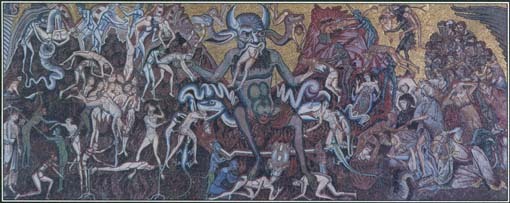Satan
The Jewish, Christian, and Muslim religions are monotheistic faiths, which means their followers believe there is only one God. That God has a powerful adversary known as Satan, or the Devil. Satan's role changed over time, as the three religions developed. At first he was a creature under God's control with the task of testing people's faith. In time, however, Satan came to be seen as the prince of darkness, ruler of all evil spirits, enemy of both God and humankind, and source of treachery and wickedness.
adversary enemy; opponent
From Adversary to Devil. The name Satan comes from a Hebrew word meaning "adversary." It first appears in the Hebrew Bible,
* See Names and Places at the end of this volume for further information.
or Old Testament. In the book of Job, God allows this adversary—sometimes called Samael in Jewish literature—to heap misfortunes on Job to see whether Job will turn against God. Judaism was influenced by the dualistic Persian religion in which good and evil struggle with each other for control of the universe and for power over human hearts and minds. The Jewish Satan took on some characteristics of Ahriman, the Persian god of evil and ruler of demons.
After about 300 B.C. , Satan came to be seen as God's enemy, the source and center of all evil in the world. The serpent that tempted Adam and Eve in Genesis, the first book of the Bible, was identified with Satan. Since that time, artists and writers have often portrayed Satan as a snake or dragon or as a monstrous combination of man and dragon. By the time the books of the Bible known as the New Testament were written, Satan's role as the Devil was well established among Christians.
The Myth of the Fatten Angel. Jewish and Christian traditions offer similar explanations for the Devil's origin. Because God would not create a being of pure evil, Satan was originally an archangel, one of God's most divine or blessed creations. His name is given sometimes as Samael but more often as Lucifer, a bright angel called son of the morning.
Some accounts say that God cast the archangel out of heaven because he would not honor Adam, the first man created by God. When the jealous archangel refused to acknowledge "a lowly thing made of dirt," God punished his pride by throwing him down into hell. There, as Satan, the fallen archangel ruled over a kingdom of devils, former angels who had followed him in his fall.
dualistic consisting of two equal and opposing forces
In Islamic tradition, Satan is known as Shaytan or Iblis. Like the Jewish and Christian Satan, he is a fallen angel who was punished

Other versions of the archangel's fall say that he was thrown out of heaven because of his pride—he dared to compete with God in glory. According to a Hebrew myth, on the third day of creation, Lucifer walked in the Garden of Eden covered with brilliant, glittering jewels set in gold. He had become so filled with pride that he planned to rise above the heavens and become God's equal. God cast Satan down, and his glory turned to darkness and ashes. The Old Testament book of Isaiah describes the archangel's fall:
How art thou fallen from heaven,
O Lucifer son of the morning!
How art thou cast down to the ground,
Which thou who didst weaken the nations!
Christian legends frequently depict Satan as a tempter who tries to lure the faithful into abandoning their faith. Stories such as the legend of Faust show people making bargains with the Devil. They generally give their souls—for which he is always hungry—in exchange for a gift such as wealth, love, or power. Such bargains always end in terror and despair, unless God steps in to save the poor sinner's soul from Satan.
epic long poem about legendary or historical Heroes, written in a grand style
One of the best-known and most influential literary portraits of Satan can be found in Paradise Lost, an epic by the English poet John Milton published in 1667.
See also Adam and Eve ; Ahriman ; Angels ; Devils and Demons ; Faust ; Heaven ; Hell ; Job ; Persian Mythology ; Semitic Mythology ; Serpents and Snakes .